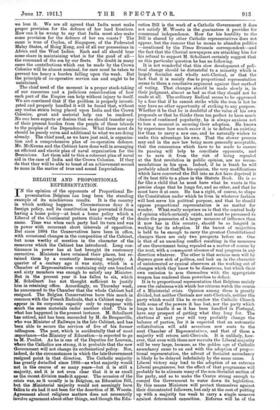TOPICS OF THE DAY.
THE NAVY AND THE EMPIRE.
BY far the most important event of the week was the announcement in regard to the Navy and the Empire made by the First Lord of the Admiralty at a public meet- ing at Pontypool on Tuesday night. Mr. McKenna explained to his audience the very satisfactory nature of the naval arrangements which had been made with the Dominions. Two years ago the principle was laid down that " each of the Dominions should contribute in the fashion most appropriate to its resources and its internal public opinion to the strength of the Empire. Some would do it by direct contribution to the power of the British fleet, either by annual payment or by the gift of ships, or both. Others by the develop- ment of fleets of their own." In the latter case Mr. McKenna went on to say that there would be inter- changeability of officers and men and such common standards of training and discipline as to ensure, in the event of war, that the joint fleets would be able to act in complete union. " The statesmen of the Dominions had joined with the Government in providing and maintaining the necessary means of defence, and, while there was to be no interference with the autonomy of each member of the Empire, the foundations had been laid of a naval strength which, if combined in war, would safeguard Imperial interests in every part of the globe."
We congratulate Mr. McKenna most heartily upon his having the honour and good fortune to make such an announcement, for it is, we are convinced, of the highest importance. In the first and last resort the Empire rests upon the command of the sea. The Empire is like a pearl necklace. It depends for its existence upon the cord upon which the pearls are strung. Break that cord and the necklace ceases to exist as an entity. It becomes nothing but a fortuitous concourse of precious beads. So it is with the Empire. The Empire is strung upon and kept together by sea-power. Destroy that binding force and the Empire is but a collection of geographical expres- sions. So long as we keep the command of the sea, and our ships can pass to and fro as they will, and no man can say them nay, the Empire is united even more closely and efficiently than if there were a continuity of British land from London to Wellington. Once, however, break the magic spell of sea-power and we shall become like the sea- divided Gael, the wayward and poetic race which, though set everywhere within the hearing of the waves, never learnt to rule them, but imbibed only the mystery and the melancholy and the terror of the ocean. We are the sea-united British—but only sea-united so long as we are the possessors of sea-power. Therefore all depends upon the maintenance of sea-power. While we maintain it we are safe. If we lose it we are of all men most miserable. Then temple and tower, sceptre and crown, must fall in ruin and for ever.
The need for maintaining sea-power has become instinc- tive in the people of these islands. It is in their very blood. Happily, in crossing to the uttermost ends of the earth, they have not lost that instinct. " Czelum non animum mutant."* And , keeping this instinct unimpaired in themselves, they have in a large measure communicated it to the white races to whom they are joined abroad, to the French-speaking people of Canada and the Dutch- speaking people of South Africa. To-day the whole Empire is alive to the fact that to talk about the main- tenance of the Empire is idle unless we maintain our command of the sea, and, therefore, a supreme naval force. This is the great Imperial fact of the last few years. With the realization of the truth has come action. Till the year 1909 the Motherland bore alone practically the whole burden of maintaining the command of the sea. Now, though the greater part of that burden must still be borne by the people of these islands, the daughter nations not only understand that they must bear their proportionate share, but have already begun to do so in the various and appro priate ways described by Mr. McKenna.
Though the British people are proud and grateful for what the daughter nations have undertaken to do, there have been in some anxious minds misgivings as to
• " They change the skies above them, But not their hearts who roam."
whether they are doing it in the right way. Naval experts tell us, and in a sense tell us truly, that as the sea is one and indivisible, sea-power is also one and indivisible, and that thereforeyou cannot maintain that power through local navies and under a divided control. There is clearly only one way of commanding the sea,and that is, when war comes, of beating and destroying the fleets of those who challenge your power over the world of waters. Naval power means a concentra• tion of naval force. But, it is argued, how an you have a concentration of naval force unless you have unity of naval command ? Allied fleets are notoriously weak fleets, as our naval commanders in the past proved again and again against the allied fleets of France and Spain. May we not, then, lose our command of the sea if we rely upon a fleet which is not united and homogeneous, but partly under the control of the Admiralty here and partly under the control of the Governments of the Dominions ?
Our answer is that the truths which we have just set forth in regard to sea-power are so clear as well as so funda- mental that we do not believe that they will be missed by the statesmen or the peoples of the Dominions. They will realize that Australian or Canadian ships of war are built to fight the ships of the enemy, not to parade along their coasts or ornament their harbours. To prove effective they must be used to seek out and destroy those enemy's ships. Where the enemy's ships float is the place for our battle fleet. Australia and Canada, they will readily understand, may be far more effectively defended by action in the North Sea than by action in their home waters. It is by beating the enemy that sea-power is achieved, not by mounting guard over the coast line of the Dominions. What will it profit them to have five squadrons at home if the British Fleet has been destroyed in a great fleet action off the mouth of the Elbe ? But, say the critics, even if this is realized in principle, how are we to prevent local anxieties or mistaken local patriotism getting the better of sound theory ? Might not sectional jealousy of the Admiralty defeat our best-laid plans ? We do not believe it. Remem- ber how great is the prestige of the Admiralty and how strong the traditions of our Navy. The Colonial squad- rons, even when most localized, will be inspired by the spirit which inspired Blake and Hawke, Rodney and Nelson—the authentic spirit of the seamen who laid low the Armada. In any case, and even if the risk exists, we must run it, for remember that unless we run it we shall never get effective support from the Colonies. The plan of Colonial subsidies, that is, direct money pay- ments, may be the best possible in theory, but we are convinced that it is the worst possible in practice. When carried out it could only mean some very moderate grant in aid to the British taxpayer. The Dominions, where populous enough and rich enough to provide their own contributory fleets, will render us an aid far more effective than the aid of a money dole. By creating local navies the Dominions will create also an Imperial naval sentiment and an Imperial naval patriotism. Their ships will be educators in the science of sea-power. We have made a great advance towards the creation of an Imperial Navy through the action of the four Dominions, but the matter must not rest there. We want a clear and coherent plan of naval defence which will bring into line, not merely the self-governing com- munities, but the Crown Colonies and Dependencies. No part of the Empire must be unfairly or disproportionately requisitioned in the matter of the provision of sea-power, but every part of the King's realm must do its fair share. We look forwaril to the time when every square mile inhabited by subjects of the Crown, from India and Ceylon to the last and least of the Crown Colonies, will make some provision, however small, towards strengthening the cord upon which the pearls are strung. The first step is to bring in India. No doubt in the case of India we must be most careful, since India is not a voluntary agent, not to violate our great principle in the govern- ment of Dependencies, the principle that we govern, not in our own interests, not even in the interests of the Empire, but in the interests of the governed. But while firmly main- taining this principle we must not out of sentimentality or pedantry ignore the fact that the welfare of the people of India is bound up with the maintenance of the Empire. If we lose the command of the sea our dominion in Indi must perish, and India must fall a victim partly to the barbarians of the border and partly to the inroads by sea of those to whom the command of the sea will pass when we lose it. We are all agreed that India must make proper provision for the defence of her land frontiers. How can it be wrong to say that India must also make some provision for the defence of her sea coasts ? The same is true of Ceylon, of Singapore, of the Federated Malay States, of Hong Kong, and of all our possessions in Africa and the West Indies. Each and all should bear some share in maintaining what is for the good of all— the command of the sea by our fleets. No doubt in many cases the contributions which can be made by the Crown Colonies will be almost nominal, for care must be taken to prevent too heavy a burden falling upon the weak. But the principle of co-operative service can and ought to be maintained.
The chief need of the moment is a proper stock-taking of our resources and a judicious consideration of how each part of the Empire can help without injury to itself. We are convinced that if the problem is properly investi- gated and properly handled it will be found that, without any undue strain being placed upon India and the Crown Colonies, great and material help can be rendered. No one here expects or desires that we should transfer any of their present burden from the people of these islands to the peoples of the Dependencies. What these must do should be purely extra and additional to what we are doing already. The chief need, as we have just said, is organiza- tion and a comprehensive plan of co-operative defence. Mr. McKenna and the Cabinet have done well in arranging an efficient and elastic plan of naval organization for the Dominions. Let them add to this a coherent plan of naval aid in the case of India and the Crown Colonies. If they do that they will be able to boast of an achievement second. to none in the matter of true and sound. Imperialism.











































 Previous page
Previous page